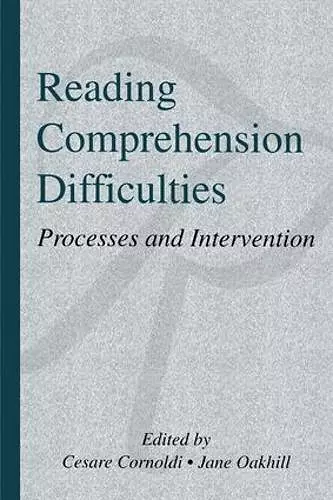Reading Comprehension Difficulties
Processes and Intervention
Cesare Cornoldi editor Jane V Oakhill editor
Format:Paperback
Publisher:Taylor & Francis Ltd
Published:17th Oct '16
Currently unavailable, and unfortunately no date known when it will be back
This paperback is available in another edition too:
- Hardback£160.00was £160.00(9780805818451)

Recognizing the characteristics of children with learning disabilities and deciding how to help them is a problem faced by schools all over the world. Although some disorders are fairly easily recognizable (e.g., mental retardation) or very specific to single components of performance and quite rare (e.g., developmental dyscalculia), schools must consider much larger populations of children with learning difficulties who cannot always be readily classified. These children present high-level learning difficulties that affect their performance on a variety of school tasks, but the underlying problem is often their difficulty in understanding written text. In many instances, despite good intellectual abilities and a superficial ability to cope with written texts and to use language appropriately, some children do not seem to grasp the most important elements, or cannot find the pieces of information they are looking for. Sometimes these difficulties are not immediately detected by the teacher in the early school years. They may be hidden because the most obvious early indicators of reading progress in the teacher's eyes do not involve comprehension of written texts or because the first texts a child encounters are quite simple and reflect only the difficulty level of the oral messages (sentences, short stories, etc.) with which the child is already familiar. However, as years go by and texts get more complex, comprehension difficulties will become increasingly apparent and increasingly detrimental to effective school learning. In turn, studying, assimilating new information, and many other situations requiring text comprehension -- from problem solving to reasoning with linguistic contents -- could be affected.
Problems with decoding, dyslexia, and language disorders have attracted more interest from researchers than have specific comprehension problems and have occupied more room in specialized journals. Normal reading comprehension has also been a favorite with researchers. However, scarce interest has been paid to subjects who have comprehension difficulties. This book is an attempt to remedy this situation. In so doing, this volume answers the following questions:
* Does a reading comprehension problem exist in schools?
* How important and widespread is the problem?
* Is the problem specific?
* How can a reading comprehension difficulty be defined and identified?
* Does the "syndrome" have a single pattern or can different subtypes be...
"...provides a useful overview of issues and recent work in the field, introducing some worthwhile British and European work that may be unfamiliar to American readers. The editors have preserved the complexity of a set of challenging and important research questions."
—Contemporary Psychology
"I recommend the volume as a thought-provoking and well-informed source of knowledge about comprehension failure during reading....After reading this book, I still find reading comprehension a fascinating and somewhat obscure topic that defies even the best in the field."
—European Journal of Cognitive Psychology
"The...coherence of this book is due to excellent editing, a very good introduction and the fact that the contributors are engaged in a dialogue rather than an argument....This is an important theoretical book and deserves to be in the libraries of teaching, speech and language therapy, and EP services."
—Child Language Teaching and Therapy
ISBN: 9781138984615
Dimensions: unknown
Weight: 557g
390 pages